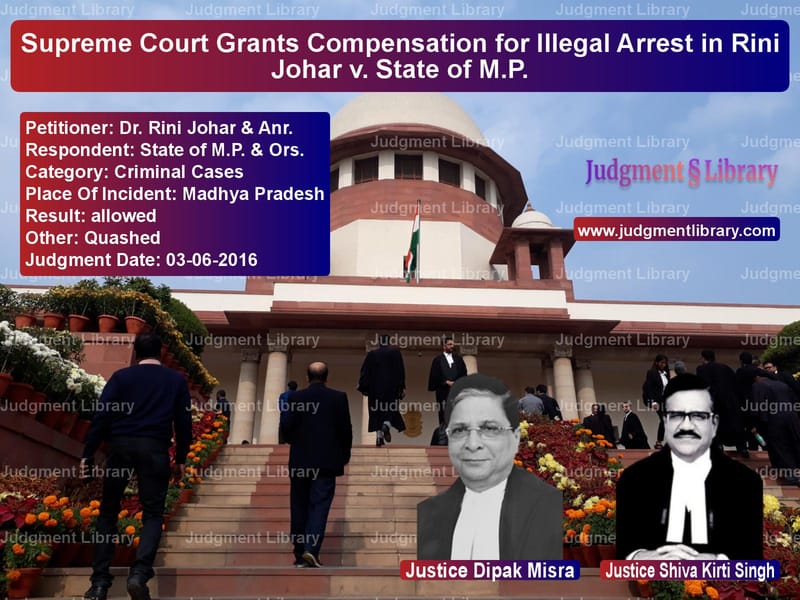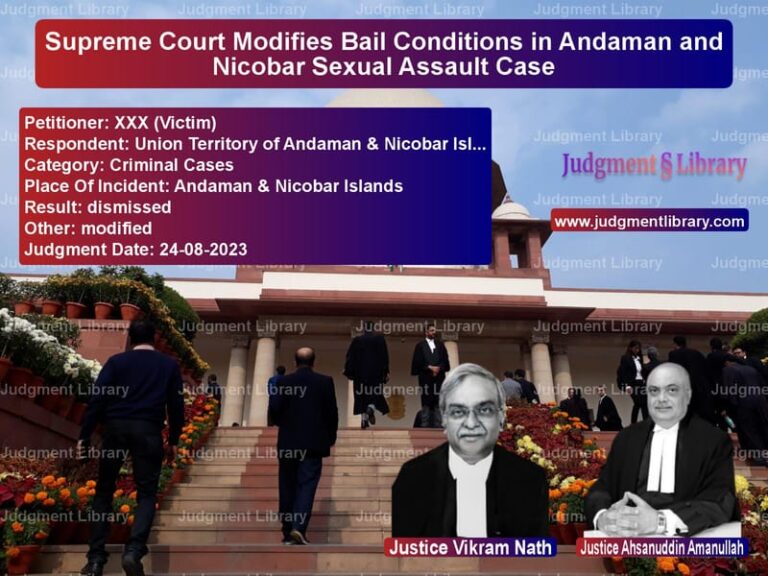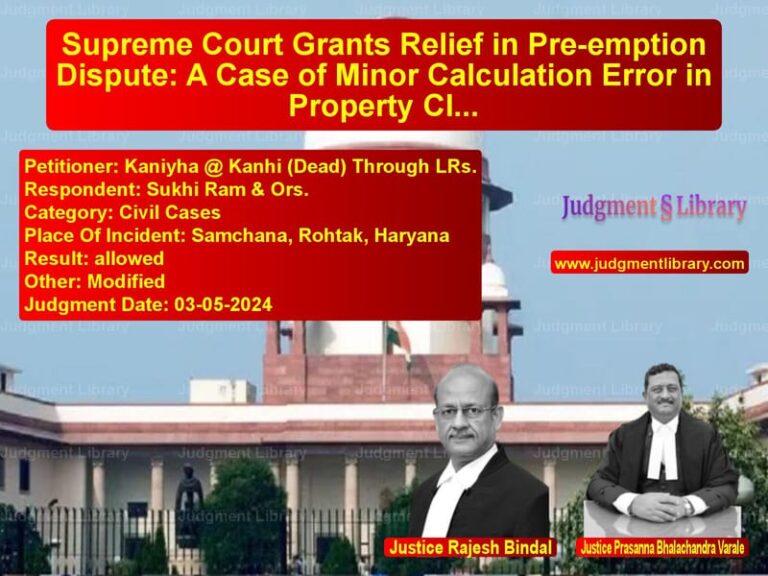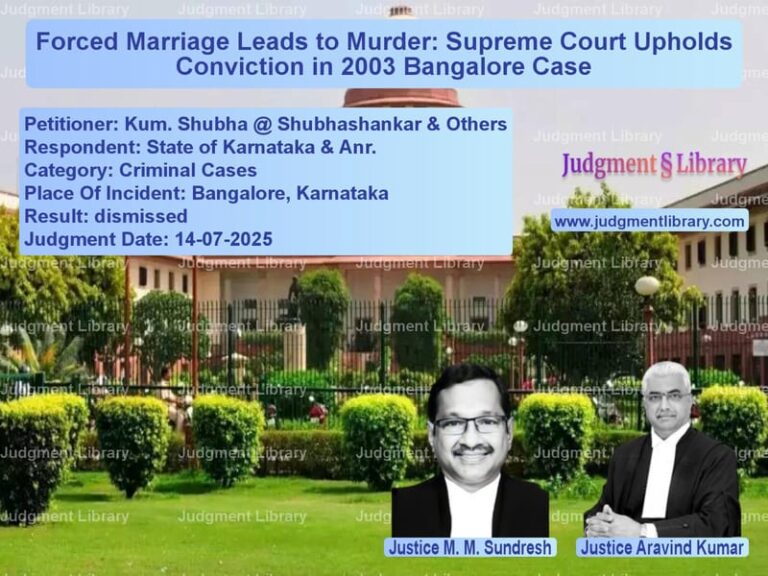Supreme Court Grants Compensation for Illegal Arrest in Rini Johar v. State of M.P.
The Supreme Court of India, in the case of Dr. Rini Johar & Anr. v. State of M.P. & Ors., ruled on the issue of illegal arrest and detention of two women by the Madhya Pradesh Cyber Cell. The Court held that the police had grossly violated the procedural safeguards required for arrest and directed compensation to be paid to the petitioners.
Background of the Case
The first petitioner, Dr. Rini Johar, was a doctor pursuing higher studies in the United States and operated an NGO for South Asian abused women in the USA. The second petitioner, Gulshan Johar, was a practicing advocate in Pune.
The issue arose when a complaint was filed by one Vikram Rajput, alleging that Dr. Rini Johar and a US-based company, Progen, committed fraud involving a transaction for an Aura Cam 6000 machine. The complaint resulted in the registration of an FIR No. 24/2012 by the Cyber Police Headquarters, Bhopal, under Sections 420 and 34 of the IPC and Section 66-D of the Information Technology Act, 2000.
Arguments by the Petitioners
- The arrest and detention were conducted in a degrading and unlawful manner.
- The petitioners were forcibly taken from Pune to Bhopal in an unreserved railway compartment meant for disabled passengers.
- Despite being a 70-year-old woman, petitioner no.2 was denied medical attention during the journey.
- They were forced to pay a bribe of Rs.5 lakhs to the investigating officers for their release.
- Procedural safeguards under Section 41-A of CrPC were not followed, and they were not produced before a local magistrate in Pune before being taken to Bhopal.
Arguments by the Respondents (State of M.P.)
- The state claimed that an internal inquiry was already conducted, and disciplinary action was initiated against the concerned officers.
- They argued that there was sufficient material to justify the registration of the FIR.
- They urged the Court not to interfere at this stage since the matter was under investigation.
Supreme Court’s Observations
1. Violation of Arrest Procedures
The Court noted that procedural safeguards for arrest and detention, as laid down in D.K. Basu v. State of W.B., were blatantly disregarded. The Court observed:
“The arrest of the petitioners was carried out in violation of the mandatory safeguards provided under Section 41-A CrPC.”
2. Illegal Custody and Humiliation
The Court was highly critical of the manner in which the petitioners were transported and detained:
“The dignity of the petitioners, a doctor and a practicing advocate, has been seriously jeopardized. Liberty, which is the strongest pillar of democracy, cannot be allowed to be frozen in such a contrived winter.”
3. Bribery Allegations Against Police Officers
The petitioners had alleged that they were forced to pay Rs.5 lakhs to a Dy. S.P. in the Cyber Cell, Bhopal. The Court noted that an internal inquiry confirmed prima facie evidence of corruption and observed:
“The officers of the State had played with the liberty of the petitioners and, in a way, experimented with it. Law does not countenance such kind of experiments as that causes trauma and pain.”
4. Compensation for Illegal Detention
The Court held that the petitioners were entitled to compensation for the unlawful deprivation of their liberty and humiliation they faced:
“The State of M.P. is directed to pay a sum of Rs.5,00,000/- (rupees five lakhs only) to each of the petitioners as compensation.”
The Court also directed that the state could initiate recovery proceedings against the erring officers responsible for the illegal actions.
5. Quashing of Criminal Proceedings
The Court found that the entire criminal case was civil in nature and did not constitute a criminal offense. It ruled:
“The FIR and criminal proceedings against the petitioners are quashed, as no ingredients of Section 420 IPC are remotely attracted.”
Supreme Court’s Final Decision
- The criminal proceedings against the petitioners were quashed.
- The State of Madhya Pradesh was directed to pay Rs.5 lakhs each to the petitioners within three months.
- The state was allowed to proceed against the erring police officers responsible for the illegal detention.
- The Court emphasized that police powers should not be misused and that arbitrary arrests must be prevented.
Implications of the Judgment
1. Strengthening Safeguards Against Illegal Arrests
The ruling reaffirms that law enforcement agencies must strictly adhere to procedural safeguards, such as those laid down in D.K. Basu and Arnesh Kumar.
2. Upholding the Right to Liberty
The judgment highlights that arbitrary arrests violate the fundamental rights of citizens under Article 21 of the Constitution.
3. Holding Police Officers Accountable
The decision empowers victims of unlawful detention to seek compensation and disciplinary action against erring officers.
Conclusion
The Supreme Court’s ruling in Dr. Rini Johar v. State of M.P. serves as a strong precedent against unlawful arrests and police excesses. By awarding compensation and quashing the criminal case, the Court upheld the rule of law and protected individual liberty from state overreach.
Don’t miss out on the full details! Download the complete judgment in PDF format below and gain valuable insights instantly!
Download Judgment: Dr. Rini Johar & Anr vs State of M.P. & Ors. Supreme Court of India Judgment Dated 03-06-2016-1741872311411.pdf
Direct Downlaod Judgment: Direct downlaod this Judgment
See all petitions in Custodial Deaths and Police Misconduct
See all petitions in Judgment by Dipak Misra
See all petitions in Judgment by Shiva Kirti Singh
See all petitions in allowed
See all petitions in Quashed
See all petitions in supreme court of India judgments June 2016
See all petitions in 2016 judgments
See all posts in Criminal Cases Category
See all allowed petitions in Criminal Cases Category
See all Dismissed petitions in Criminal Cases Category
See all partially allowed petitions in Criminal Cases Category







